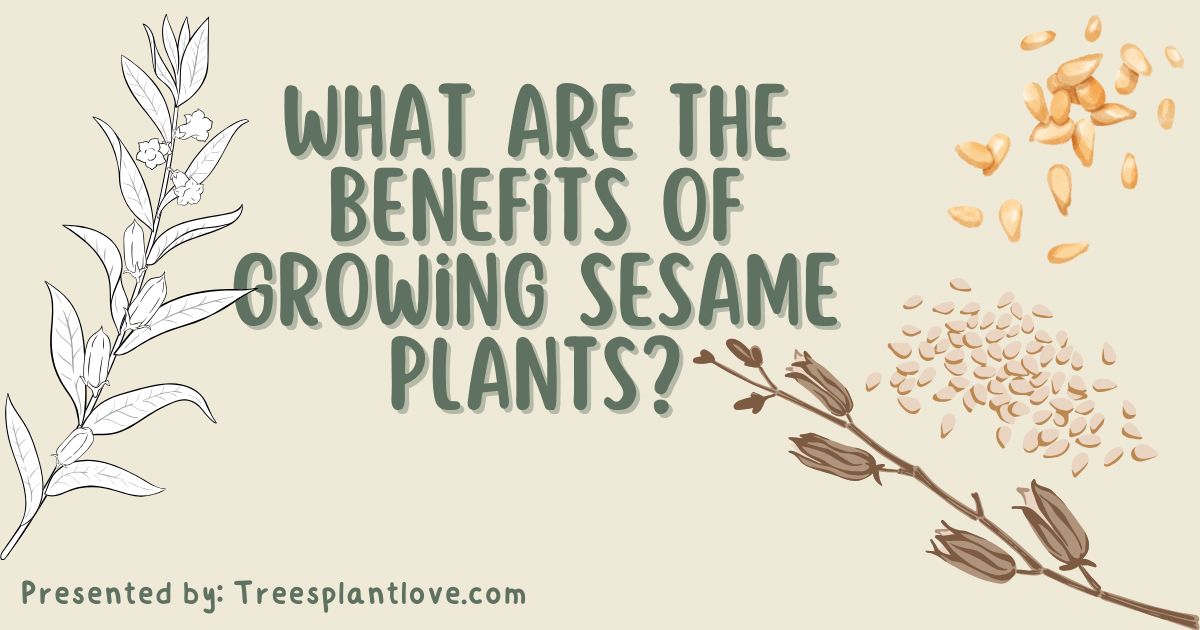
What Are the Benefits of Growing Sesame Plants? Health, Economic & Environmental Advantages
What Are the Benefits of Growing Sesame Plants?: Sesame (Sesamum indicum), one of the oldest cultivated crops in the world, offers an array of benefits, both for the environment and for those who grow it.
This small, yet powerful plant is widely recognized for its edible seeds, which are packed with nutrients and used in various food products. However, the benefits of growing sesame plants extend far beyond their culinary uses.
From enriching soil health to offering economic opportunities, sesame plants are a valuable addition to any garden or farm.
Nutritional and Culinary Benefits
Sesame seeds are renowned for their rich nutritional profile, making them a popular ingredient in a variety of dishes. They are a great source of protein, healthy fats (especially unsaturated fats), and dietary fiber, which makes them a staple in many diets worldwide.
Rich in vitamins (particularly B vitamins) and minerals like calcium, magnesium, and iron, sesame seeds contribute to bone health, improve digestion, and help regulate blood sugar levels.
When you grow your own sesame plants, you have access to fresh, organic sesame seeds, which can be used to make sesame oil, tahini, or sprinkled directly on salads, baked goods, or stir-fries.
With growing interest in plant-based and gluten-free diets, sesame provides an excellent source of plant protein and healthy fats.
Economic Benefits
For farmers, sesame cultivation can be a lucrative endeavor. The global demand for sesame seeds and sesame-based products, such as oil, tahini, and snacks, has been steadily increasing.
This high demand has led to a strong market for sesame crops, which can be a source of income for smallholder farmers, especially in regions with suitable growing conditions.
Additionally, sesame plants are highly adaptable to various climates, making them a valuable crop for farmers in areas where other crops may not thrive.
Whether grown in dry, semi-arid regions or in tropical climates, sesame plants are relatively easy to grow, require fewer inputs (such as water and fertilizers) than some other crops, and yield high returns.
Soil Enrichment and Agricultural Sustainability
Sesame plants contribute to sustainable farming practices by improving soil health. As a drought-tolerant crop, sesame has deep roots that help break up compacted soil, allowing better water infiltration and reducing soil erosion.
The cultivation of sesame also adds organic matter to the soil, enriching it with nutrients and making it more fertile for future crops.
Additionally, sesame plants are known for their ability to fix nitrogen in the soil. Nitrogen is a crucial nutrient for plant growth, and sesame’s role in naturally replenishing this element can reduce the need for chemical fertilizers, promoting more eco-friendly farming practices.
Low Water Requirements and Drought Resistance
In regions where water is scarce or where droughts are common, sesame plants are an ideal choice for cultivation.
These plants are remarkably drought-resistant, and their deep taproots allow them to access water from deeper soil layers. This means they can survive and thrive in conditions where many other crops might fail.
By growing sesame, farmers can adapt to changing climate conditions and minimize water usage in areas with limited irrigation resources. Sesame’s resilience in dry environments also makes it an important crop for food security in arid and semi-arid regions.
Health Benefits of Sesame Oil
One of the most notable by-products of sesame plants is sesame oil, which is highly valued for its health benefits. Sesame oil is rich in antioxidants, such as sesamol and sesamin, which help combat oxidative stress and reduce inflammation in the body.
The oil is also an excellent source of monounsaturated fats, which promote heart health by lowering LDL cholesterol levels and improving cardiovascular function.
In addition, sesame oil is often used in traditional medicine for its purported benefits in skin care and hair care. It’s known to have moisturizing properties and is commonly used as a base for massage oils or skin treatments. For those with an interest in natural, holistic wellness, growing sesame plants to produce your own oil can be a rewarding practice.
Pest and Weed Control
Another hidden benefit of growing sesame is its role in pest and weed management.
The dense canopy of sesame plants can shade the ground and prevent the growth of weeds, reducing the need for chemical herbicides. Additionally, sesame plants have natural resistance to a range of pests, which can reduce the need for pesticide applications.
By incorporating sesame into crop rotations or polyculture systems, farmers can improve biodiversity and reduce the overall reliance on chemical inputs. This contributes to healthier ecosystems and more sustainable farming practices.
Cosmetic and Pharmaceutical Uses
The oil extracted from sesame seeds is also used in various cosmetic and pharmaceutical products due to its natural properties. Sesame oil has been incorporated into skincare products such as lotions, creams, and soaps because of its hydrating and antioxidant-rich nature.
Its anti-aging and anti-inflammatory properties make it ideal for soothing the skin, treating conditions such as eczema, and promoting skin elasticity.
Moreover, sesame has been traditionally used in alternative medicine to treat ailments such as high blood pressure, diabetes, and even arthritis.
Researchers continue to explore the potential therapeutic properties of sesame compounds, particularly for their role in reducing inflammation and improving heart health.
Conclusion
Growing sesame plants offers a wealth of benefits that extend from nutritional and economic advantages to environmental sustainability.
Whether you’re a farmer looking for a drought-tolerant crop that adds value to your land, or a health-conscious individual interested in fresh sesame seeds or oil, sesame cultivation has something to offer.
Its diverse uses in cooking, cosmetics, and even traditional medicine make it an incredibly versatile and valuable plant.
As the demand for organic, sustainable, and health-conscious products grows, sesame plants are poised to become an even more important crop in the years to come, making them a great choice for those looking to maximize both their harvest and their impact on the environment.

Leave a Reply